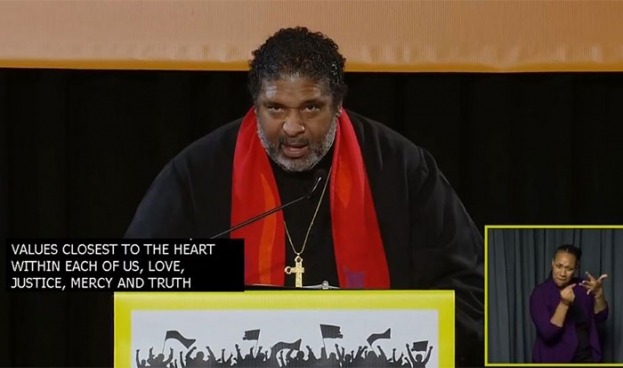A democracy is supposed to reflect the will of the people. When people vote, speak out at community meetings, or protest, they are responding not only to particular politicians and parties but to the policies they represent and the ones people want instituted. Life in a democracy is about more than love of country and appreciation of the services we receive from the government. It's about deciding how to allocate resources — where the money and other support goes and who benefits from it.
I got to thinking about allocation of resources as I watched the virtual Mass Poor People's Assembly and Moral March on Washington on June 20, 2020. Speakers streamed in from across the country demanded a moral revolution for our time. Those most directly impacted by poverty were given most of the time in the nearly three-hour program to tell their stories and make their demands.
The Moral March was wrapped up by a rousing speech by co-chair William J. Barber II. In his speech, Barber clearly established that this campaign wants to change the moral trajectory of the country, and it is also, and most importantly, rooted in calls for visible and sustainable change for the people.
He laid out in plain language just how the demands of the Poor People's Campaign can be met. It's about reconstructing everything with policies that support life, liberation, and love. It's about reallocating resources.
At the end of the March, I found myself reflecting on the specific items that Barber lists in his speech. I copied them down. As you review them, think about how you want the country's resources allocated. And what can you do to change the way they are.
- "If we instituted fair elections and restricted the influence of big money in our politics, we could transition to automatic online voter registration and give life to our democracy by ensuring eligible voters can vote.
- "If we have a hero's bill – we need to make sure there is money for city and municipal workers to save the jobs of public services workers, but also guarantee healthcare, living wages, sick leave, rent forgiveness, moratorium on utilities being cut off.
- "A $15 /hour minimum wage would raise pay for 49 million workers by 328 billion dollars per year; 49 million people would come up out of poverty.
- "If we implemented a housing wage, we could raise pay for 83 million workers by more than $1 trillion going into the economy.
- "If we end mass incarceration, we could significantly reduce the $179 billion that currently goes to policing, courts, and prisons, and this would give life to our communities and raise resources to secure housing for all.
- "If we stop pouring money and resources into the border wall, we could move that $24 billion into children’s k-12 education and give life to their dreams.
- "If we canceled one military contract, we would have $25 billion to expand Medicaid in the 14 states that have not already done so under the Affordable Care Act.
- "If we cancelled another military contract, we would have more than enough resources to put towards expanding our water infrastructure and creating 945,000 jobs instead of putting those resources in war.
- "If we cut $350 billion from the military budget and closed some of the 800 bases, we would still have more money than China and North Korea and Iran, and Iraq combined. But we could make the world a safer place and put those resources towards healthcare and lifting our people
- "If we had put the $6.4 trillion that we have poured into endless wars since 9/11 into green energy, we would have built a renewable energy grid by now with nearly $2 trillion to spare.
- "If we restore the corporate tax rate to what it was before the Trump tax cuts, we would raise 130 billion dollars per year. This would be more than enough resources to fund the $100 billion we need to provide early childcare and education for every child in this country.
- "If we instituted a tiny tax on Wall Street trades, we would raise more than the $70 billion we need to invest in free public college for all.
- "If we implemented a wealth tax on the richest households in the country, we would raise $270 billion a year to put towards fixing our public infrastructure.
- "If we taxed inherited wealth fairly, we could raise $78 billion a year and we could use that to close the racial wealth gap with baby bonds programs that would establish a saving account with resources for every American child.
- "If we repented of the injustices against indigenous peoples and implemented fair policies for undocumented Americans and homeless Americans, we could change our present and our future and have a true healing from the past."
You can visit the Poor People's Campaign website to learn more about what their mission, goals, how they envision their demands playing out, and ways to get involved locally here. You can watch the full live stream of the March (which I highly recommend), or skip to 2:54:14 for Barber's concluding speech.

 Reallocating Resources in a Democracy
Reallocating Resources in a Democracy